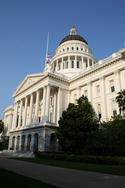Over the next four decades, American governments will oversee a much larger and far more diverse population. As we gain upward of 100 million people, America will inevitably become a more complex, crowded and competitive place, but it will continue to remain highly dependent on its people's innovative and entrepreneurial spirit. read more »
Newgeography.com - Economic, demographic, and political commentary about places
Is Sweden a False Utopia?
By Nima Sanandaji and Robert Gidehag
Sweden is often held up by American pundits and experts as a kind of Utopia, a country to be emulated. As is often the case when dealing with Utopias however, the complexities of history, culture and policy frequently are shoved aside.
Rather than being guinea pigs in a progressive experiment in social engineering, Swedes are a unique people with a long history. Therefore, we should question the lazy assumption that good Swedish outcomes (long life expectancies, social equality) are due to particular Scandinavian policies (the welfare state). read more »
California is Too Big To Fail; Therefore, It Will Fail
Back in December I wrote a piece where I stated that California was likely to default on its obligations. Let’s say the state’s leaders were less than pleased. California Treasurer Bill Lockyer’s office asserted that I knew “nothing about California bonds, or the risk the State will default on its payments.” My assessment, they asserted, “is nothing more than irresponsible fear-mongering with no basis in reality, only roots in ignorance. Since it issued its first bond, California has never, not once, defaulted on a bond payment.” read more »
How Tough Times May Lead to Better Architecture
By Richard Reep
While Ben Bernanke fantasizes about the Recovery, most people in the building industry – especially in overbuilt Florida – will correct this gross error immediately and emphatically. The recession may be over for the Fed Chairman, but unemployment in the design and construction professions is probably in the 25-30% range, matching that of the Great Depression.
Even so, tiny glimmers of light shine in what many design professionals call the “microeconomy” of building – small commercial renovations, house additions, tenant improvements, and other projects normally too small to even be counted. read more »
Can David Cameron Close the Deal?
With the Labour Government exhausted and its supporters dismayed, why isn’t the Conservative Party leader David Cameron sailing home to victory?
Under the leadership of Prime Minister Gordon Brown, all the weaknesses of the Labour Party have been painfully exposed. British Prime Ministers are elected by the House of Commons, and the Members of that Parliament by the people; so when Brown’s predecessor Tony Blair resigned, his replacement as Labour Party leader became Prime Minister without a general election. read more »
Finding the Good in This Bad Time
This year's best places rankings held few great surprises. In a nation that shed nearly 6.7 million jobs since 2007, the winners were places that maintained or had limited employment declines. These places typically had high levels of government spending (including major military installation or large blocs of federal jobs) or major educational institutions. Nor was the continued importance of the energy economy surprising in a nation where a gallon of gas is still about $3 a gallon. read more »
- Login to post comments
The Worst Cities For Jobs
In this least good year in decades, someone has to sit at the bottom. For the most part, the denizens are made up of "usual suspects" from the long-devastated rust belt region around the Great Lakes. But as in last year's survey, there's also a fair-sized contingent of former hot spots that now seem to resemble something closer to black holes.
read more »
Guns, Guts, And Geithner
Calls for more bank regulators remind me of a regulatory go-round with an erratic European bank chairman to whom I once reported. Almost eighty years old, with a failing memory and a fondness for mid-day Martinis, he once interrupted a luncheon to call his wife and ask that she send his revolver over to the bank.
At one time in his life he might have had a license to carry a firearm, but the permit had long expired. He wanted the great equalizer on this particular afternoon because the television was full of possible terror threats against financial interests, and he figured, after his second highball, that outside agitators read more »
Las Vegas: The World’s Convening City?
Conventional wisdom, and in many cases wishful thinking, among many urbanists holds that America’s sunbelt cities are done. Yet in reality, as they rise from the current deep recession, their re-ascendance will shock some, but will testify to the remarkable resiliency of this emerging urban form.
Origins: Bright Light City read more »
Contemporary China's Mirror Image: Imperial Germany
China has emerged as the bad boy on the global scene, pushing around executives at Rio Tinto, attacking Google, and humiliating Barack Obama at the Copenhagen Climate Talks. Speculation is growing about China’s rising power and the country’s leaders are displaying a discouraging sense of hubris. There is growing fear that the autocratic Middle Kingdom will soon dominate the world.
These fears have parallels with another rising power of a century ago: Imperial Germany. Both emerged quickly on the global scene and did so with an enormous chip on their shoulders. Like China today, Germany was a little late coming to the industrial revolution, though its cultural contribution to European civilization and in turn to American civilization was enormous read more »






















